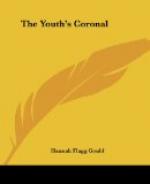“She says they had buttons as large as our dollars,
To wear on their coats with their square, standing
collars;
And then, there’s a droll sort of
hat,
Which Mary once fixed me one like, out of paper,
And said she believed ’twas called three-cornered
scraper;
Perhaps, too, she’ll let us see
that.
“Oh! a glorious time we shall have! If
they knew
At the south, what it is, I guess they’d have
one too;
But I have heard somebody say,
That, there, they call all the New England folks Bumpkins,
Because we eat puddings, and pies made of pumpkins,
And have our good Thanksgiving-day.”
“I think, brother Charles,” returned Edward
“at least,
That they might go to church, if they don’t
like the feast;
For to me it is much the best part,
To hear the sweet anthems of praise, that we give
To Him, on whose bounty we constantly live:—
It is feasting the ear and the heart.
“From Him, who has brought us another year round,
Who gives every blessing, wherewith we are crowned,
Their gratitude who can withhold?
And now how I wish I could know all the poor
Their Thanksgiving-stores had already secure,
Their fuel, and clothes for the cold!”
“I’m glad,” said their father, “to
hear such a wish;
But wishes alone, can fill nobody’s dish,
Or clothe them, or build them a fire.
And now I will give you the money, my sons,
Which I promised, you know, for your drum and your
guns,
To spend in the way you desire.”
The brothers went home, thinking o’er by the
way,
For how many comforts this money might pay,
In something for clothing or food:
At length they resolved, if their mother would spend
it,
For what she thought best, they would get her to send
it
Where she thought it would do the most
good.
=The Mountain Minstrel=.
On our mountain of Savoy,
In the shadow of a rock,
Once I sat, a shepherd-boy,
Watching o’er my father’s
flock.
We’d a happy cottage-home,
Peaceful as the sparrow’s nest,
Where, at evening, we could come
From our roamings to our rest.
I’d a minstrel’s voice and ear:
I could whistle, pipe and sing,
While I roving, seemed to hear
Music stir in every thing.
But misfortune, like a blast.
Swift upon my father rushed;
From our dwelling we were cast—
At a stroke our peace was crushed.
All we had was seized for debt:
In the sudden overthrow,
Even my fond, fleecy pet,
My white cosset, too, must go.
Then I wandered, sad and lone,
Where I’d once a flock to feed;
All the treasure now my own
Was my simple pipe of reed.
But a noble, pitying friend,
Who had seen me sadly stray,
Made me to his lute attend;
And he taught me how to play.
Then his lute to me he gave;
And abroad he bade me roam,
Till the earnings I could save
Would redeem our cottage-home.




